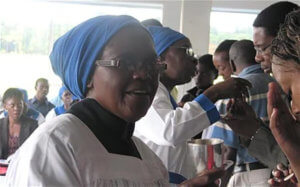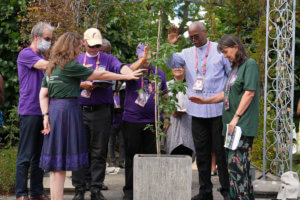
Mind the Gap
My flight from Heathrow after the Lambeth Conference touched down at 8:15 Eastern time Tuesday night. As Jere and I crunched into our familiar gravel driveway on Mary Street at about 10:30, I imagined the 1450 or so Lambeth Conference bishops, spouses, staffers, exhibitors, and volunteers all returning to their own contexts — in Dar Es Salaam, Bujumbura, Oxford, Rio de Janeiro, Jerusalem, Los Angeles, Panama, Cape Town, Paris, Nairobi, Tana, and Wickford, RI.
 There are Anglicans in 165 countries — approximately 85% of the world’s universally recognized states. Especially for us Westerners, it’s important to remember that the average Anglican is not a member of The Episcopal Church in the United States, or of the Church of England. Instead, she is a 25–year-old African mother. Our experiences and perspectives in the global Anglican Communion are as varied as our languages, our climates, our races, and our clothing, and our differences both challenge and deepen our experience of God in the other.
There are Anglicans in 165 countries — approximately 85% of the world’s universally recognized states. Especially for us Westerners, it’s important to remember that the average Anglican is not a member of The Episcopal Church in the United States, or of the Church of England. Instead, she is a 25–year-old African mother. Our experiences and perspectives in the global Anglican Communion are as varied as our languages, our climates, our races, and our clothing, and our differences both challenge and deepen our experience of God in the other.
Relationship
With every one of us made in the image of God, we most fully reflect that image in our grand, diverse whole. If we all looked alike, and were all from the same context, we would see only a tiny bit of God’s reflection in us. As difficult as difference can be sometimes, we are way less without it. Here’s another unexpected and often frustrating truth: the Anglican Church functions very differently from the Roman Catholic Church. In the Roman Catholic Church, whether directly or through Church hierarchy, the Pope is in charge.
The Anglican Communion is a radically democratic structure, particularly in The Episcopal Church, where our church polity — how we make decisions — looks like our secular government. It’s a democracy. The greatest power of the global Anglican Communion — all the Provinces together — is specifically that it has no power at all. It is relational and advisory only. Yet, it’s the glue that holds us all together. Each of the 42 Provinces in the global communion is an independent church and cannot dictate to other Provinces on any matter of polity. It’s all about relationship, where God meets in the middle, connecting us all.
Differences
Even before the bishops’ and spouses’ retreats of the Lambeth Conference started July 27, the global church press — and even some of the mainstream press — was focused on the difference in views regarding human sexuality and marriage between The Episcopal Church and other mostly Western Provinces, and the Global South (which is made up mostly of African, Eastern, and South American Provinces). As you know, the law of the land in the United States of America, and the sacraments of The Episcopal Church, support and affirm marriage equality and human dignity of all persons. Full Stop.
And other Provinces of the Anglican Communion — a majority, actually, when you count it — come from different contexts, often with direct and continuing threats to their lives and ways of life that do not prioritize human sexuality over other serious issues facing their communities. I would be very glad to discuss marriage equality and human sexuality at length and in detail with anyone who would like to talk about it. It is a matter of the very highest pastoral concern, focus and support. Please call or email me with any questions.
Environmental Focus
I would like to share the news, however, that the focus of the Lambeth Conference, regardless of what you might have read in the press, was actually on the environment. As I heard a bishop say on Day 1, Why are we even discussing something that we’ve prayed about and deliberated in our own Provinces and reached our different decisions on? A settled and ongoing difference of view is should not be the front page issue. The environment should cover the front page and every other page after that. Leave everything else off. In other words, we don’t have to come to the same place on every issue in our many different contexts to walk together on the ones that affect us all.
 On Wednesday of the second week of the conference, just under 1500 bishops, spouses, and staffers like me attended a garden party at Lambeth Palace in London, which has been the home of the Archbishop of Canterbury for over 800 years. The focus of our day in Lambeth Palace’s 1000-year-old and noticeably dry garden was to launch the Communion Forest, the Anglican Alliance’s initiative to engage every Province and Diocese, in their own individual contexts, to take specific action to care for the environment. Archbishop Justin underscored the climate emergency, both in the dry, hot Lambeth Palace garden and in the plenary sessions back at the University of Kent where our meetings themselves had become dry and hot at the start of the conference as a result of the focus on Communion disagreements instead of our common priority of climate care.
On Wednesday of the second week of the conference, just under 1500 bishops, spouses, and staffers like me attended a garden party at Lambeth Palace in London, which has been the home of the Archbishop of Canterbury for over 800 years. The focus of our day in Lambeth Palace’s 1000-year-old and noticeably dry garden was to launch the Communion Forest, the Anglican Alliance’s initiative to engage every Province and Diocese, in their own individual contexts, to take specific action to care for the environment. Archbishop Justin underscored the climate emergency, both in the dry, hot Lambeth Palace garden and in the plenary sessions back at the University of Kent where our meetings themselves had become dry and hot at the start of the conference as a result of the focus on Communion disagreements instead of our common priority of climate care.
As Archbishop Justin said, climate change leads to migration as people seek resources and flee life-threatening effects of climate change — fire, drought, floods, food scarcity, and rising oceans. This migration leads to war and conflict over scarce and diminishing resources; and then that war and conflict further challenge resources, creating a rapid downward spiral. Climate change affects us all, is caused primarily by the well-resourced countries, affects the least resourced and especially the island communities most, and is the most important issue we all have together. The Anglican Church is uniquely well-suited to provide ways to collaborate and share information, as well as to support and nurture hope and faith. The curiosity and hope inherent in our faith can also help us have the flexibility and agility of different approaches to fit different contexts.
Gaza
I heard a story on NPR yesterday about the Israeli government’s recent repair of failing sewerage systems in Gaza that were causing dangerous sewage leaks onto beaches where people were swimming. While the political differences between Israel and Palestine remain deeply entrenched, the Israeli government was moved to fix the damaged system in deeply depressed Gaza through an appeal to Israel’s best interest and national security. Allowing the health threat in Gaza to continue put the State of Israel’s security at risk, so they made the repairs regardless of their continuing conflict with Gaza in the midst of current uprisings.
I came to bring fire
 As usual, today’s gospel speaks directly to this issue. Luke’s Jesus starts and stays strong: I came to bring fire to the earth, and how I wish it were already kindled! I have a baptism with which to be baptized, and what stress I am under until it is completed! Do you think that I have come to bring peace to the earth? No, I tell you, but rather division! … father against son and son against father, mother against daughter and daughter against mother, mother-in-law against her daughter-in-law and daughter-in-law against mother-in-law.
As usual, today’s gospel speaks directly to this issue. Luke’s Jesus starts and stays strong: I came to bring fire to the earth, and how I wish it were already kindled! I have a baptism with which to be baptized, and what stress I am under until it is completed! Do you think that I have come to bring peace to the earth? No, I tell you, but rather division! … father against son and son against father, mother against daughter and daughter against mother, mother-in-law against her daughter-in-law and daughter-in-law against mother-in-law.
This passage has always troubled me, and even more so this time around, coming fresh from the Lambeth Conference when there was so much in the air about the divisions in our big, noisy, messy, diverse Anglican family. But I wonder — is Jesus blessing, or even calling for, conflict here? Or is he just naming it? When we consider Jesus’ absolute integrity to the point of crucifixion, it’s difficult to hear this passage as a call or even a justification for war to force others to agree with the winner, although this passage has been used to support conflict in violence and oppression from the time of the Crusades.
 Yale Divinity School professor Theresa Berger writes, If our world were nothing but a place of created goodness and profound beauty… then Jesus’ challenge would be deeply troubling. If, on the other hand, our visibly broken world is overheating, plagued in consequence and in turn by flooding, drought, and fire, with rising oceans and melting ice caps threatening all species including the human race, and we’re all caught up in systems of power and privilege that are exploitative and unsustainable, then redemption can only come when those systems are changed outright. Life cannot continue without confrontation. I believe that this is the basis of the conflict Jesus is talking about. He’s not coming to unsettle an idyllic world. He’s coming to shatter systems that aren’t working any more — habits of life we’ve grown used to that we now understand threaten our environment.
Yale Divinity School professor Theresa Berger writes, If our world were nothing but a place of created goodness and profound beauty… then Jesus’ challenge would be deeply troubling. If, on the other hand, our visibly broken world is overheating, plagued in consequence and in turn by flooding, drought, and fire, with rising oceans and melting ice caps threatening all species including the human race, and we’re all caught up in systems of power and privilege that are exploitative and unsustainable, then redemption can only come when those systems are changed outright. Life cannot continue without confrontation. I believe that this is the basis of the conflict Jesus is talking about. He’s not coming to unsettle an idyllic world. He’s coming to shatter systems that aren’t working any more — habits of life we’ve grown used to that we now understand threaten our environment.
Kenyan youth climate activist Elisabeth Wathuti spoke at the Lambeth Palace garden party, embodying Jesus’ call to crisis. She speaks truth to power, with urgency, because crisis creates opportunity — that edge where change is possible. Could this be what Jesus meant when he spoke of bringing fire to the earth? Isn’t Jesus talking about making things new? Is Jesus taking us to that edge where change is possible and away from the business as usual that means injustice and death?
Mind the Gap
 Archbishop Maimbo Mndolwa, Bishop of Tanga and Primate of the Anglican Church of Tanzania, used the mind the gap warning ubiquitous in English train and tube stations to describe the utility of the differences in our big, diverse Anglican family. If you want to stay together as one holy, apostolic, and catholic church, he said, let us be mindful of the existing gaps. My brothers from the Global South: mind the gap which exists between the South and the North. My brothers from the North: mind the gap which exists between the North and the South. Brothers and sisters, all in this conference: we should keep in mind that we have many differences, and those differences — which are created by God — are here to save us, not to break our relationships.
Archbishop Maimbo Mndolwa, Bishop of Tanga and Primate of the Anglican Church of Tanzania, used the mind the gap warning ubiquitous in English train and tube stations to describe the utility of the differences in our big, diverse Anglican family. If you want to stay together as one holy, apostolic, and catholic church, he said, let us be mindful of the existing gaps. My brothers from the Global South: mind the gap which exists between the South and the North. My brothers from the North: mind the gap which exists between the North and the South. Brothers and sisters, all in this conference: we should keep in mind that we have many differences, and those differences — which are created by God — are here to save us, not to break our relationships.
Care for our planet’s resources must be the focus of our attention as a matter of our very survival. Climate protection is a political issue, a faith issue, and a universally human issue, all bound up in power and economic interest, but susceptible to curiosity, faith, hope, and flexibility if we’re careful to mind the gap of our different contexts and not assume our own experience looks like everyone else’s. In our big, messy, noisy, diverse Anglican family, it’s ok to disagree. Our strength is in our unity, not our unanimity, and in our careful attention to mind the gap. Amen
